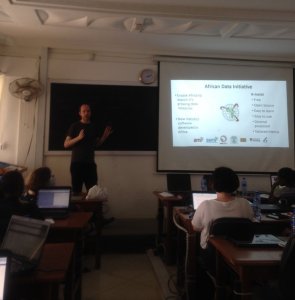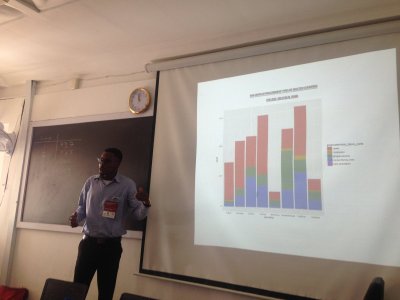Public procurement – or government contracting – is critical to development, accounting for as much as 50% of government spending in developing countries. The procurement process is known to be highly prone to corruption, however corruption is difficult to detect or measure. A recent project led by the University of Oxford in collaboration with Sussex University and Government Transparency Institute has been using and implementing new methodologies for analysing large open public procurement datasets to detect ‘red flags’ that could indicate risks of corruption. Now, researchers from Oxford Mathematics are supporting the delivery of workshops in Africa to share these new methodologies and software tools with anti-corruption groups and researchers to enable them to analyse corruption risks in public procurement data.
Danny Parsons from the African Maths Initiative and Postdoctoral Research Assistant with Prof Balazs Szendroi at the Mathematical Institute in Oxford and Dr Elizabeth David-Barrett (Sussex University) delivered a 2-day workshop at the African Institute of Mathematical Sciences (AIMS), Ghana on Analysing Public Procurement Data for Corruption Risks. This workshop came out of an earlier collaboration between Dr David-Barrett, Dr Mihaly Fazekas (Government Transparency Institute), Prof Szendroi and Danny Parsons on data driven approaches to measuring corruption risks in government contracting. During that project Danny Parsons worked on implementing new methodologies for detecting corruption risks into an open source front end to the R statistics language, to make it easier for researchers in political science, civil society organisations and anti-corruption agencies to detect patterns of corruption risk in public procurement data. In this latest workshop in Ghana, which brought together students and researchers in mathematical sciences and political science as well as civil society groups, Danny showed participants how they could use these recently developed software tools to investigate "red flag" indicators of corruption risk in large open public procurement data. The event highlighted the potential impact this could have on the fight against corruption in Africa - freely available software tools tailored to public procurement data and a growing movement towards governments opening up their data. Interestingly the workshop was picked up by local media (the Ghana News Agency and the Ghana Times) which stressed its relevance to ongoing discussions in Ghana around open government data and in particular the Right to Information Bill.




